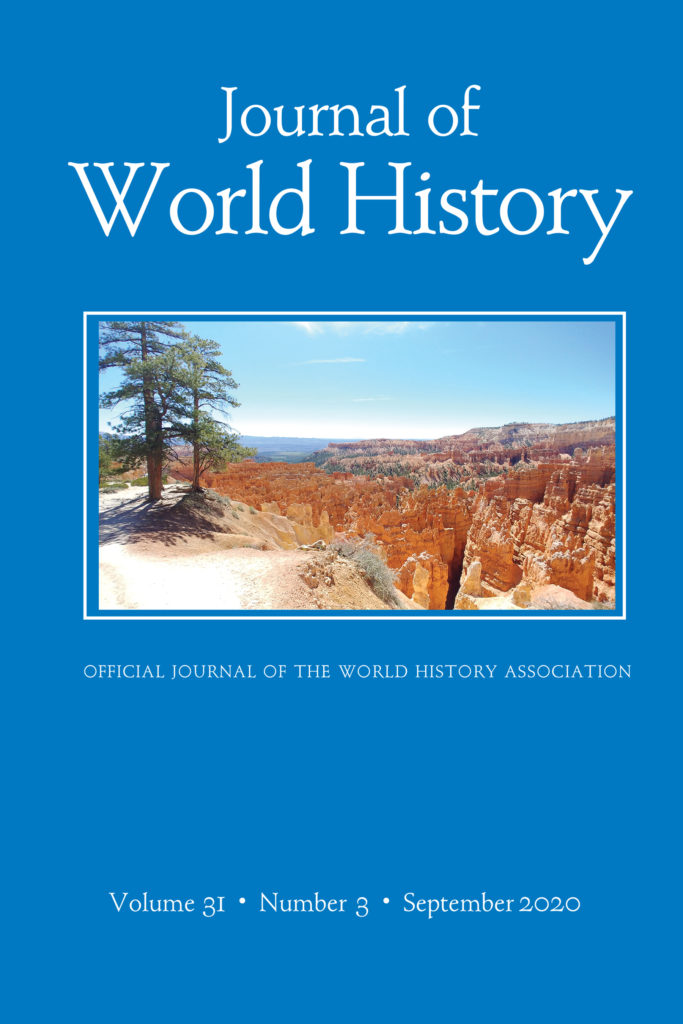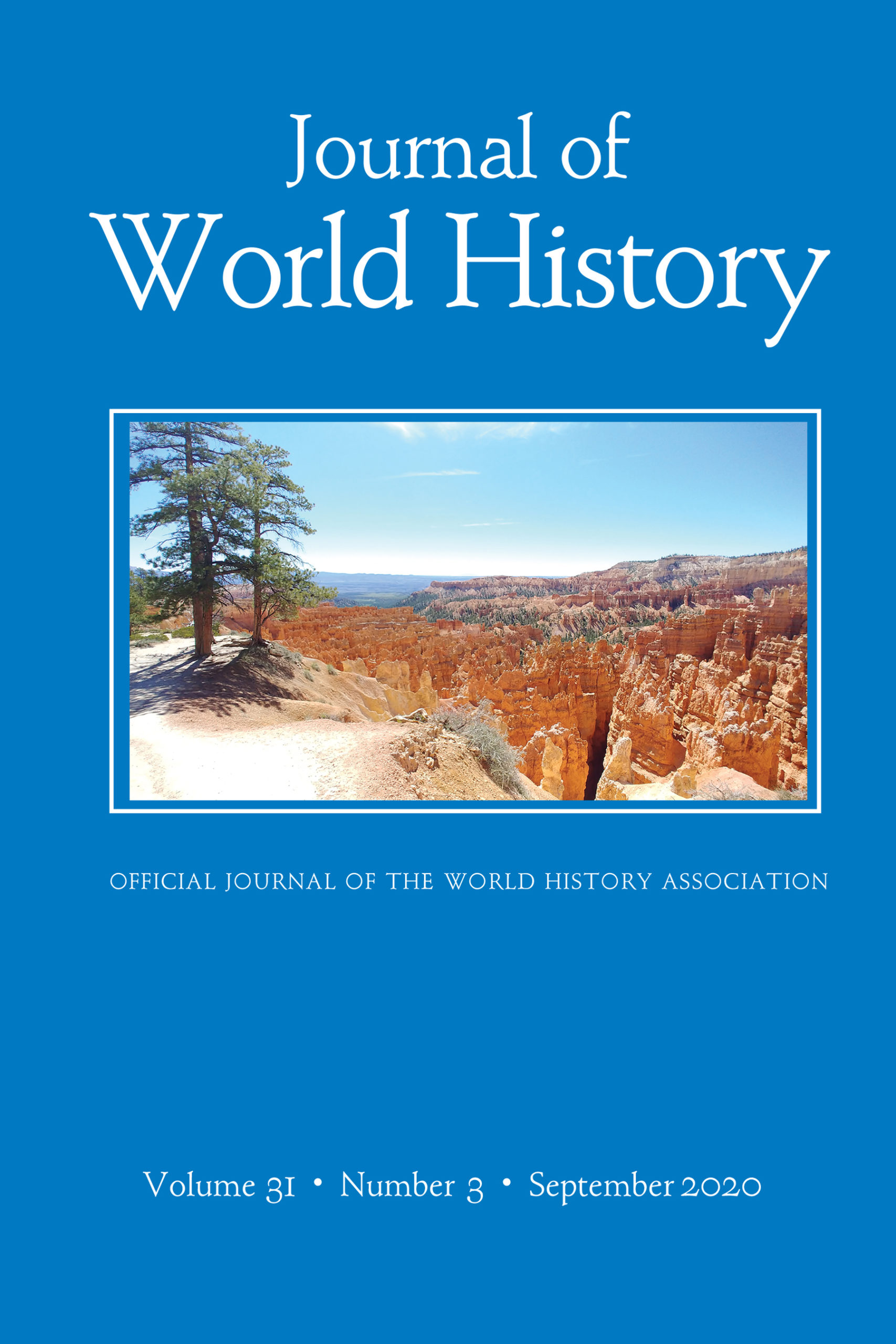The September issue of the Journal of World History is a special issue, “Crossing Companies,” guest edited by Felicia Gottmann, a Senior Lecturer in History at Northumbria University, Newcastle, and Philip Stern, the Gilhuly Family Associate Professor of History at Duke University. The issue includes five research articles, in addition to Gottmann and Stern’s introduction to the issue and a special digital-only afterword by Julia Adams and Isaac Ariail Reed (both available free on Project MUSE).
Here, Gottmann and Stern discuss how this special issue came together, editing during a pandemic, why this subject continues to interest scholars and students, and how teachers can use the issue in their classrooms.
University of Hawai‘i Press: Tell us how this special issue came together.
Gottmann and Stern: The issue was the result of many conversations among a number of scholars researching various novel ways chartered companies crossed national boundaries, some together as part of larger collaborative research projects. We decided that taken together our research would make for an interesting discussion and offered it as a panel for the 2017 American Historical Association annual meeting in Denver. This raised so many interesting points that we decided to we just had to publish the discussion as articles, and commissioned others to supplement. We proposed it as a dedicated special issue to JWH, and the rest is history. This took us three years, but we think it was worth it.
UHP: What was the most challenging thing about creating this issue as editors?
Gottmann and Stern: For a subject as broad and involved as that of early modern chartered companies the greatest challenge was that even among all of us, one special journal issue could only skim the surface of what is a broad and expansive subject, so we were constantly feeling like we were leaving out far more than we were putting in. And of course, the final stages of a collaborative issue are hard under normal circumstances; when we started this together in Denver years ago, no one could have anticipated we would be doing it in the midst of a global pandemic. Both of us have small children, which made co-authoring and editing that much more demanding. Even meant even finding times to meet virtually across five time zones when one of us was not on childcare duty or utterly exhausted was… a challenge. Honestly, we couldn’t have gotten through it without the remarkable contributors, and of course the immensely patient and accommodating editors and staff at JWH.
UHP: Why do you think early-modern trading companies continue to interest scholars and students?
Gottmann and Stern: The subject was actually one of great interest many decades ago—in some ways, our special issue is somewhat inspired by the fabulous book on Companies and Trade co-edited by Leo Blussé and Femme Gaastra in 1981. Around the same time, the fantastic work to “bring the state back in,” (to quote another important volume from the 1980s), certainly led to a generation of work that exposed the connections between state and empire formation across the globe. But since then, our attention has been drawn back to the ways in which private enterprises govern like states, making connections around the globe and building empires. While the analogy can be taken too far, the comparison—whether in terms of similarities or contrasts—with a similar phenomenon in the early modern world certainly promises fascinating insights into the origins of modern capitalism and globalization and raises questions about the role and nature of states and multinational companies. The past several decades have also seen increasingly broader interest in, and sophisticated approaches to colonial, imperial, and world history, which has no doubt been part of the renewed interest in colonial companies.
UHP: How do you see this special issue contributing to the field?
Gottmann and Stern: While scholars working on the theaters in which these companies operated, be that the Indian Ocean or the Atlantic World, have long since shown that their operations were resolutely transnational on the ground, those who study the companies qua companies continue to do so with the kind of “methodological nationalism” that Ulrich Beck has taught us to abandon long ago. Our special issue firmly demonstrates that these were transnational enterprises not just on the ground in Asia, Africa, or the Americas but that they were transnational through and through, from their very inception in Europe. So we turn the lens of World History back on Europe, demonstrating it to be part of much wider, not merely, national histories.
UHP: What advice would you give to a teacher who was interested in using your issue in their classroom?
Gottmann and Stern: We would encourage teachers to use this issue as a way into studying history away from national narratives of empire: as a way to motivate students to challenge their modernist assumptions about the coherence of notions of “nations”, “states”, and “companies”. Paired with some of the many surviving great primary sources, be that Ananda Ranga Pillai’s Diary or Bolt’s Considerations on India Affairs, this can be a brilliant way to get students to rethink world history as a history of more than just a world of nation-states.
Read the Journal of World History special issue, “Crossing Companies” on Project MUSE here.

Crossing Companies
Table of Contents
Introduction: Crossing Companies (Free)
Felicia Gottmann, Philip Stern
Between Companies: The Arbitration of 1654 and the Evolution of Corporate Strategy in the East Indies Trade
Andrew Ruoss
Prussia all at Sea? The Emden-based East India Companies and the Challenges of Transnational Enterprise in the Eighteenth Century
Felicia Gottmann
Keeping It in the Family: The Swedish East India Company and the Irvine Family, 1731–1770
Hanna Hodacs
Coda: Crossing Companies, Theories of Agency and Early Modern European Empire (Free)
Julia Adams, Isaac Ariail Reed
Plus book reviews.





